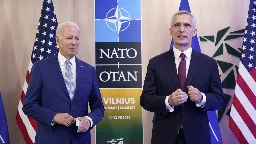Congress approves bill barring any president from unilaterally withdrawing from NATO
Congress approves bill barring any president from unilaterally withdrawing from NATO

thehill.com
Congress approves bill barring any president from unilaterally withdrawing from NATO

Congress has approved legislation that would prevent any president from withdrawing the United States from NATO without approval from the Senate or an Act of Congress. The measure, spearheaded by Sens. Tim Kaine (D-Va.) and Marco Rubio (R-Fla.), was included in the annual National Defense Authorization Act, which passed out of the House on Thursday and is expected to be signed by President Biden.
